Submitted:
18 April 2023
Posted:
19 April 2023
You are already at the latest version
Abstract
Keywords:
1. Introduction
2. Modelling
2.1. Feedforward Model
2.2. RNN Model
2.3. LSTM Model
2.4. Battery drive cycle Model
3. Methodology
3.1. Standard double layered Feedforward
3.2. Standard double layered RNN
3.3. Doubled layered LSTM Model
3.4. Bayesian optimization for deep learning counterparts
- Build a surrogate model of objective function
- Find the hyperparameters (hidden neurons in both hidden layers) that perform best on the surrogate model
- Use these hyperparameters obtained into the true objective function
- Update the surrogate model including new result
- Extract hyper parameters and build and train feedforward network based on these hyper parameters.
4. Results
| RNN | LSTM | FF | Bay RNN | Bay LSTM | Bay FF | |
|---|---|---|---|---|---|---|
| MAPE (min MAPE profile) | 10.57% | 0.81% | 0.54% | 8.09% | 8.65% | 0.06% |
| NRMSE (min NRMSE profile) | 17.42% | 1.21% | 1.33% | 13.32% | 13.96% | 0.10% |
| MAPE (average for 3 profiles) | 14.02% | 1.04% | 0.80% | 11.05% | 8.67% | 0.20% |
| NRMSE(average for 3 profiles) | 23.10% | 1.48% | 2.67% | 17.08% | 14.25% | 0.55% |
| Average MAPE | RNN | LSTM | FF | Bay RNN | Bay LSTM | Bay FF |
|---|---|---|---|---|---|---|
| (First three quarter samples) | 7.80% | 0.78% | 0.26% | 6.70% | 7.08% | 0.10% |
| (Last quarter samples) | 39.30% | 2.15% | 3.19% | 30.06% | 16.76% | 0.64% |
5. Conclusion
References
- Aryal, A., M. Hossain, and K. Khalilpour. A Comparative study on state of charge estimation techniques for Lithium-ion Batteries. in 2021 IEEE PES Innovative Smart Grid Technologies-Asia (ISGT Asia). 2021. IEEE. [CrossRef]
- Feng, X.; et al. State-of-charge estimation of lithium-ion battery based on clockwork recurrent neural network. Energy 2021, 236, 121360. [Google Scholar] [CrossRef]
- Wang, Q.; et al. Least squares support vector machine for state of charge estimation of lithium-ion battery using gray wolf optimizer. Journal of Physics: Conference Series. 2021. IOP Publishing. [CrossRef]
- Ismail, M., et al. Battery state of charge estimation using an Artificial Neural Network. in 2017 IEEE Transportation Electrification Conference and Expo (ITEC). 2017. IEEE. [CrossRef]
- Zhang, C.-W.; et al. State of charge estimation of power battery using improved back propagation neural network. Batteries 2018, 4, 69. [Google Scholar] [CrossRef]
- Chaoui, H.; Ibe-Ekeocha, C.C. State of charge and state of health estimation for lithium batteries using recurrent neural networks. IEEE Trans. Veh. Technol. 2017, 66, 8773–8783. [Google Scholar] [CrossRef]
- Chemali, E.; et al. Long short-term memory networks for accurate state-of-charge estimation of Li-ion batteries. IEEE Trans. Ind. Electron. 2017, 65, 6730–6739. [Google Scholar] [CrossRef]
- Chemali, E.; et al. State-of-charge estimation of Li-ion batteries using deep neural networks: A machine learning approach. J. Power Sources 2018, 400, 242–255. [Google Scholar] [CrossRef]
- Orr, B. The Exploding and Vanishing Gradients Problem in Time Series. 2020, Towards Data Science.
- Shewalkar, A. Performance evaluation of deep neural networks applied to speech recognition: RNN, LSTM and GRU. J. Artif. Intell. Soft Comput. Res. 2019, 9, 235–245. [Google Scholar] [CrossRef]
- Shi, Z.; et al. A long short-term memory network for online state-of-charge estimation of li-ion battery cells. in 2020 IEEE Transportation Electrification Conference & Expo (ITEC). 2020. IEEE. [CrossRef]
- Wu, J.; et al. Hyperparameter optimization for machine learning models based on Bayesian optimization. J. Electron. Sci. Technol. 2019, 17, 26–40. [Google Scholar] [CrossRef]
- Yang, F.; et al. State-of-charge estimation of lithium-ion batteries based on gated recurrent neural network. Energy 2019, 175, 66–75. [Google Scholar] [CrossRef]
- Zhang, S., Z. Liu, and H. Su, A Bayesian Mixture Neural Network for Remaining Useful Life Prediction of Lithium-Ion Batteries. IEEE Transactions on Transportation Electrification, 2022. [CrossRef]
- Xu, S.; Zhou, F.; Liu, Y. A hybrid method for lithium-ion batteries state-of-charge estimation based on gated recurrent unit neural network and an adaptive unscented Kalman filter. J. Electrochem. Energy Convers. Storage 2022, 19, 031005. [Google Scholar] [CrossRef]
- Zhang, S.; et al. A data-driven coulomb counting method for state of charge calibration and estimation of lithium-ion battery. Sustain. Energy Technol. Assess. 2020, 40, 100752. [Google Scholar] [CrossRef]
- Chen, G.; et al. Electrochemical-distributed thermal coupled model-based state of charge estimation for cylindrical lithium-ion batteries. Control. Eng. Pract. 2021, 109, 104734. [Google Scholar] [CrossRef]
- Ndeche, K.C.; Ezeonu, S.O. Implementation of Coulomb Counting Method for Estimating the State of Charge of Lithium-Ion Battery. Phys. Sci. Int. J. 2021, 25, 1–8. [Google Scholar] [CrossRef]
- Hu, X.; Li, S.E.; Yang, Y. Advanced machine learning approach for lithium-ion battery state estimation in electric vehicles. IEEE Trans. Transp. Electrif. 2015, 2, 140–149. [Google Scholar] [CrossRef]
- Nicholson, C. A Beginner's Guide to LSTMs and Recurrent Neural Networks. 2020.
- Documentation, M., Long Short-Term Memory Networks. 2022: MAthWorks Inc.
- Koutsoukas, A.; et al. Deep-learning: investigating deep neural networks hyper-parameters and comparison of performance to shallow methods for modeling bioactivity data. J. Cheminformatics 2017, 9, 1–13. [Google Scholar] [CrossRef] [PubMed]
- Arifuzzaman, M.; et al. Application of artificial intelligence (ai) for sustainable highway and road system. Symmetry 2020, 13, 60. [Google Scholar] [CrossRef]
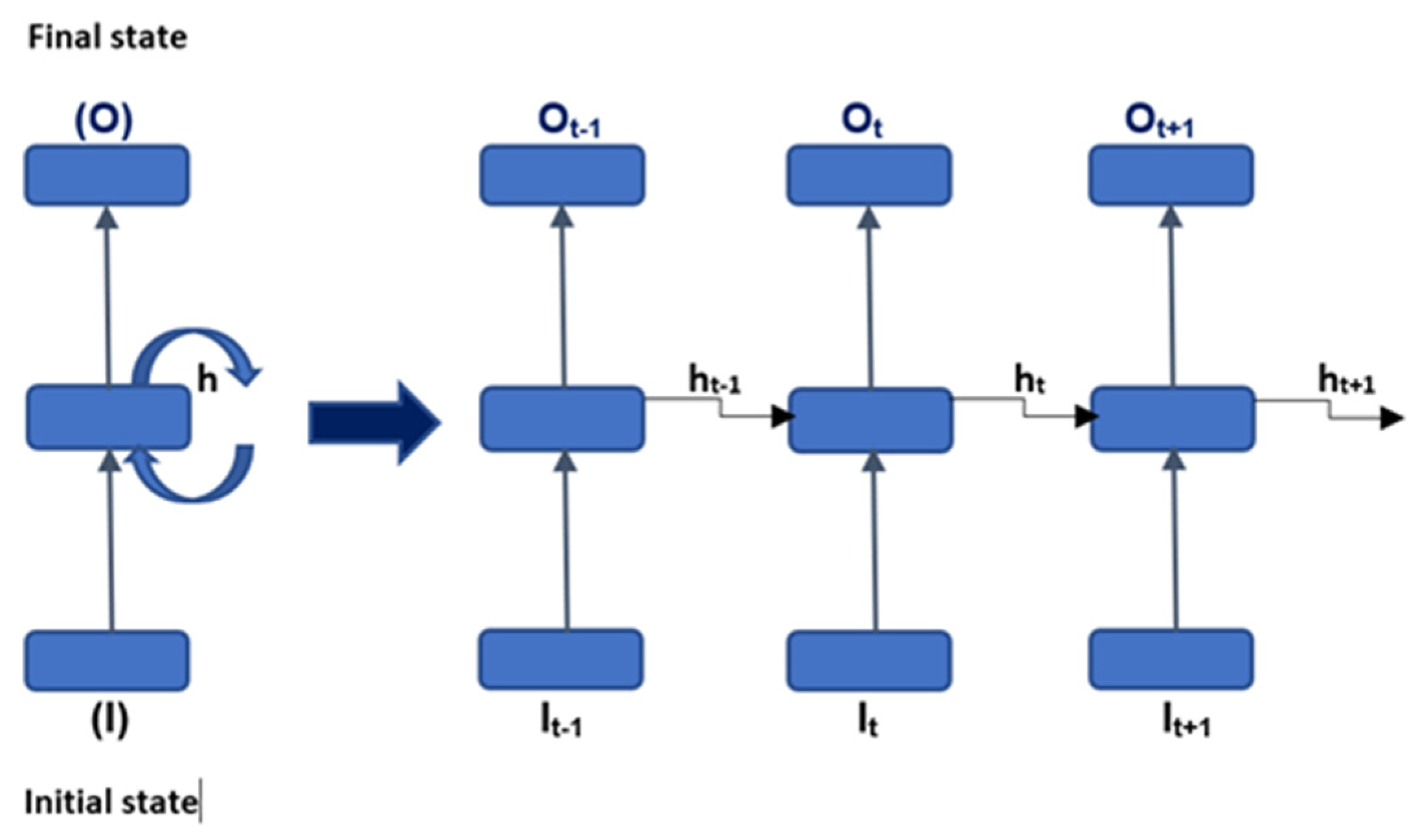
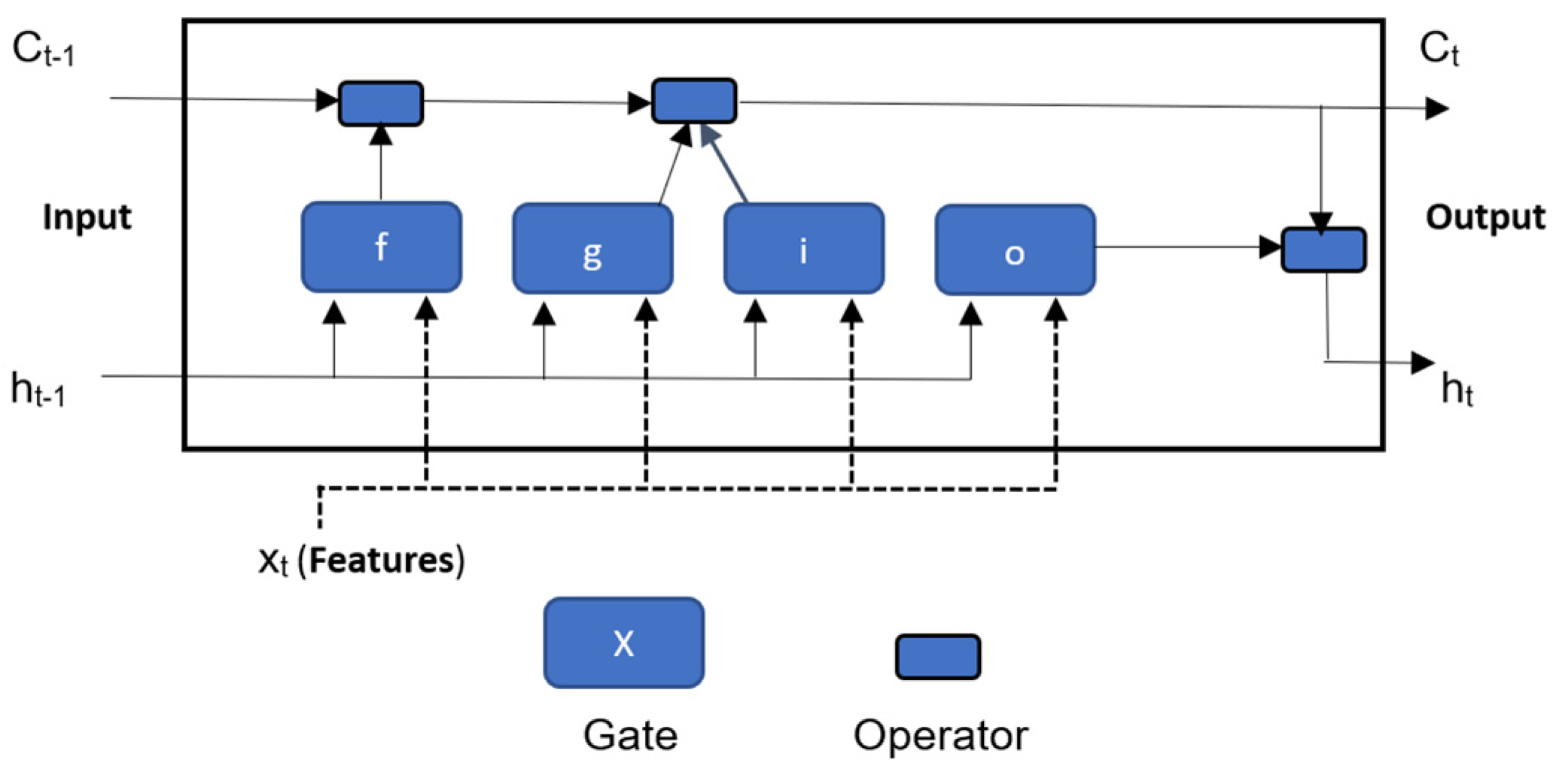

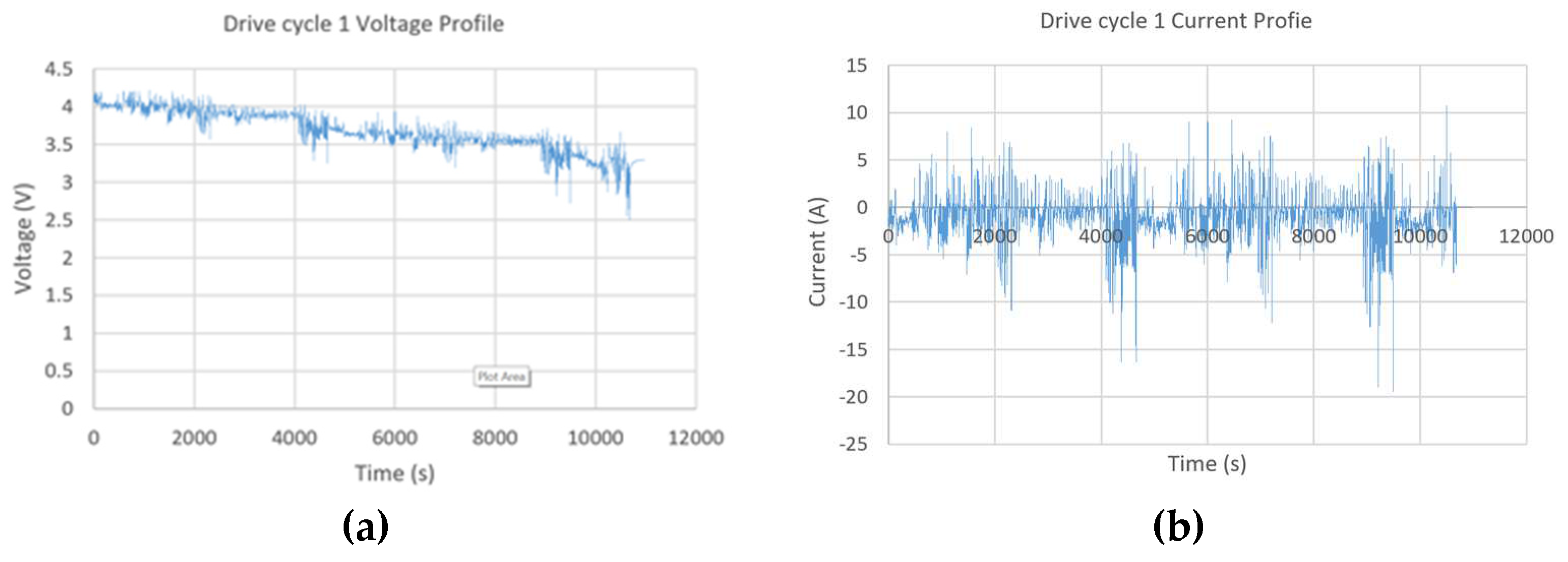

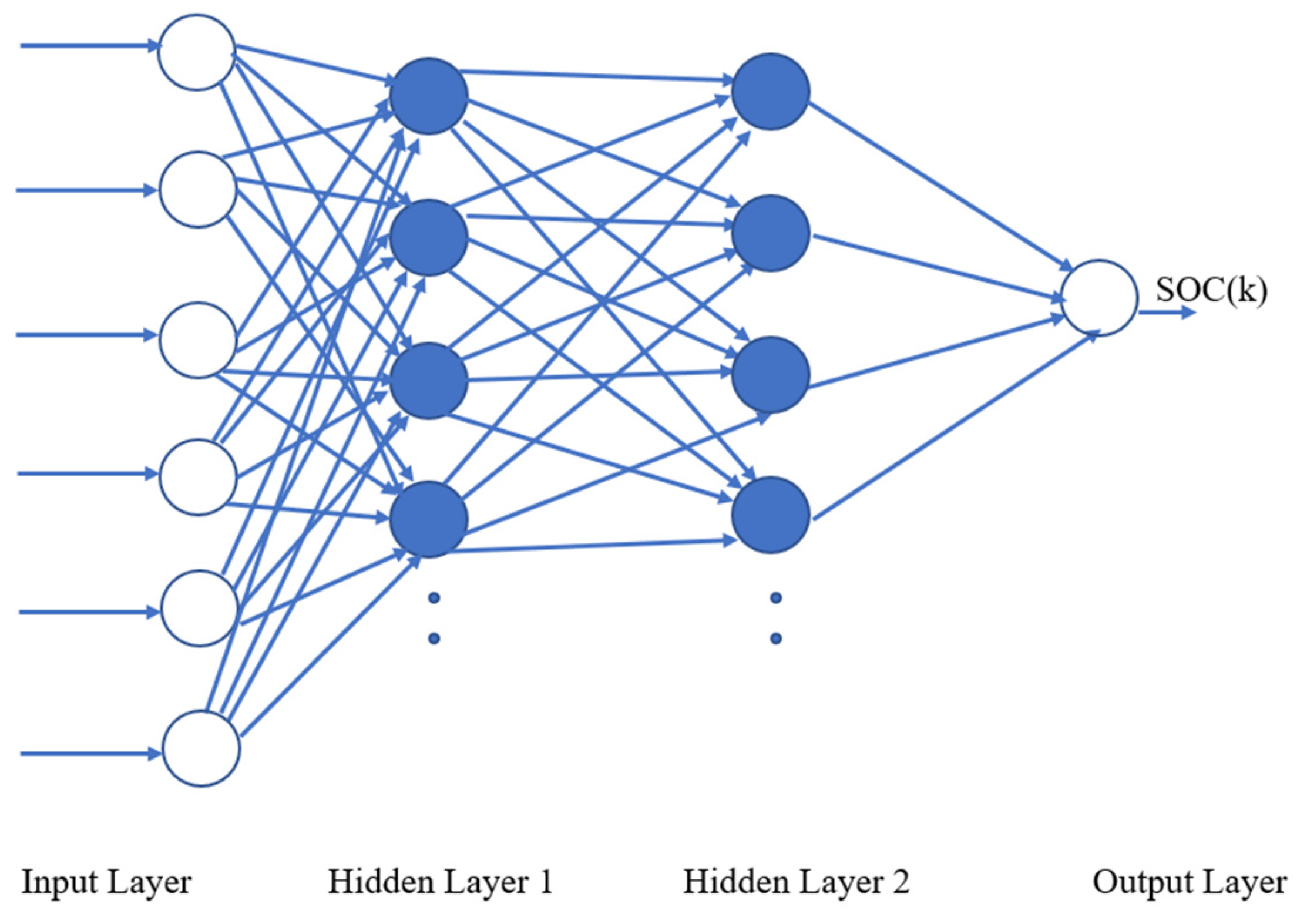

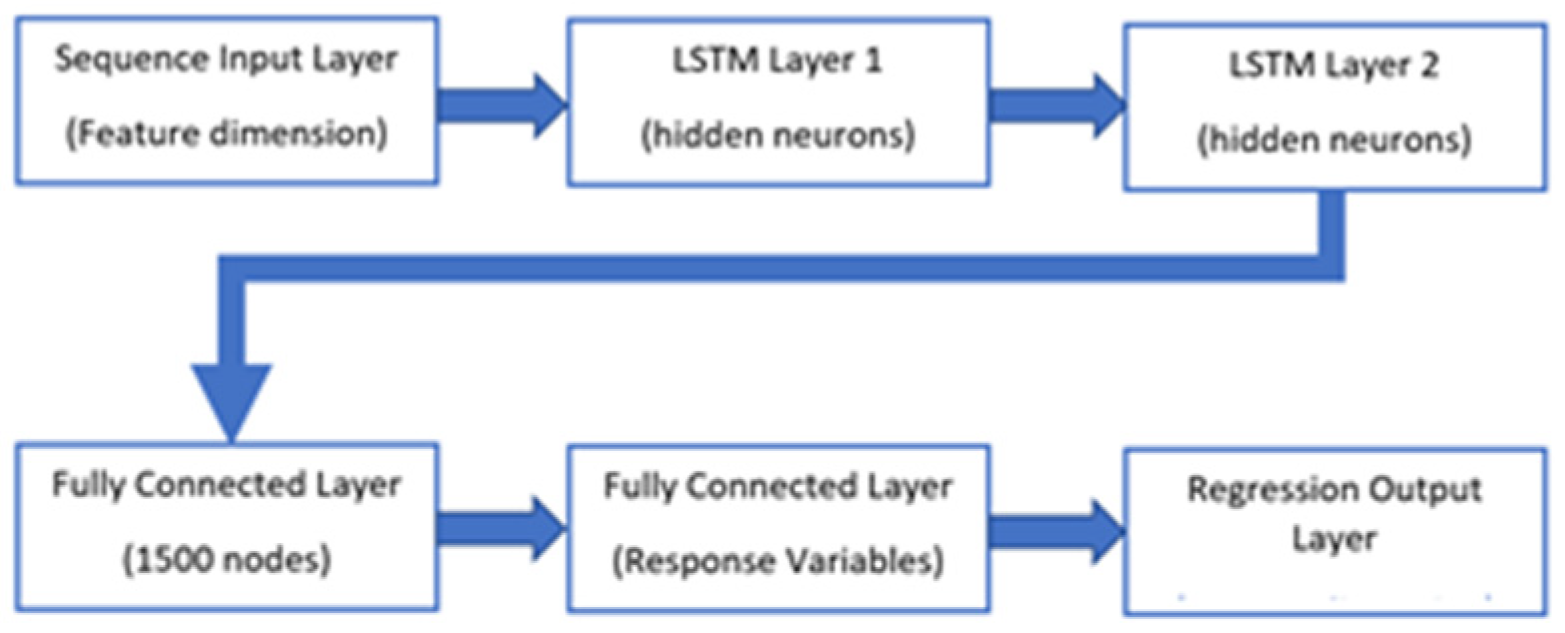
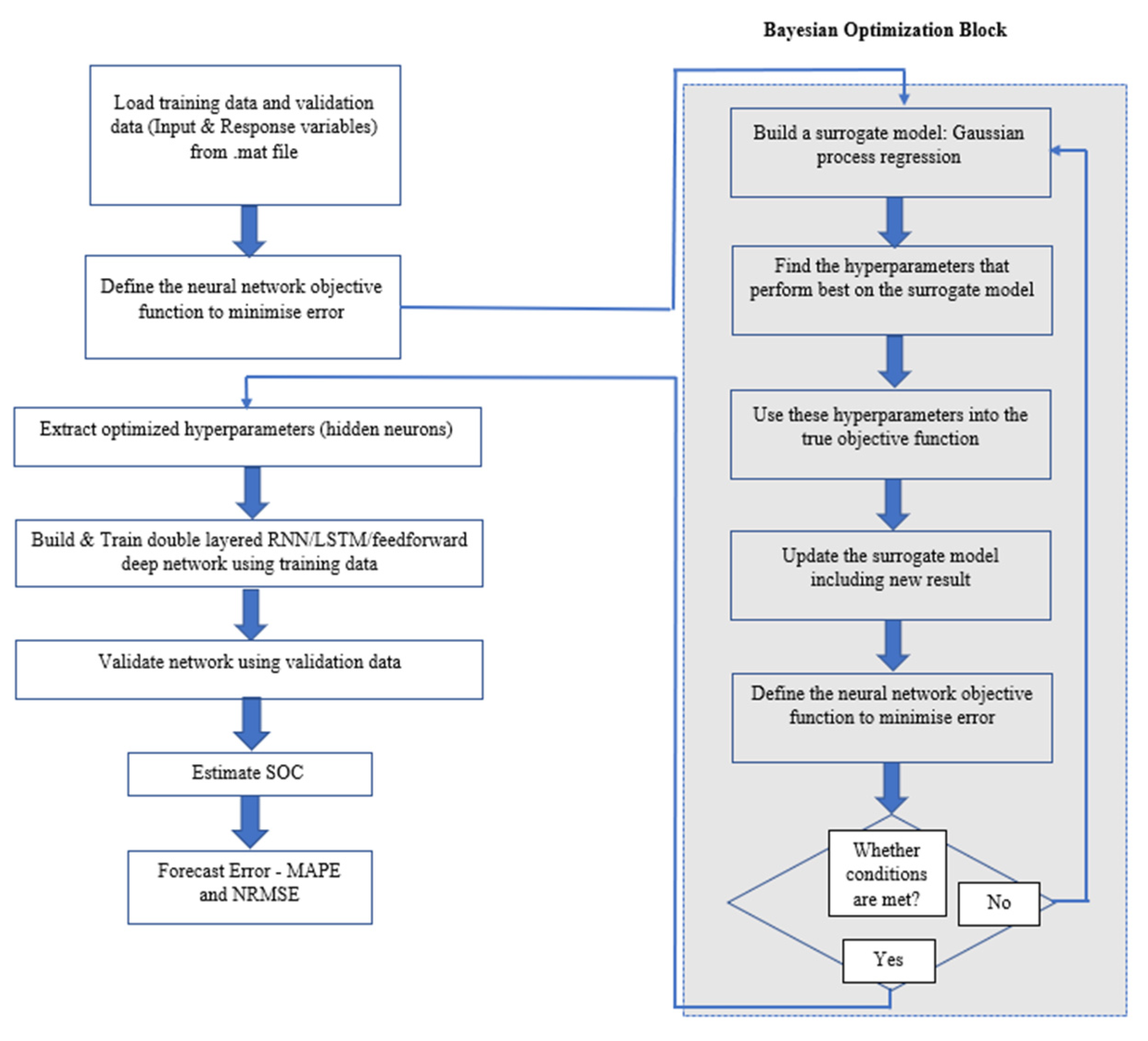
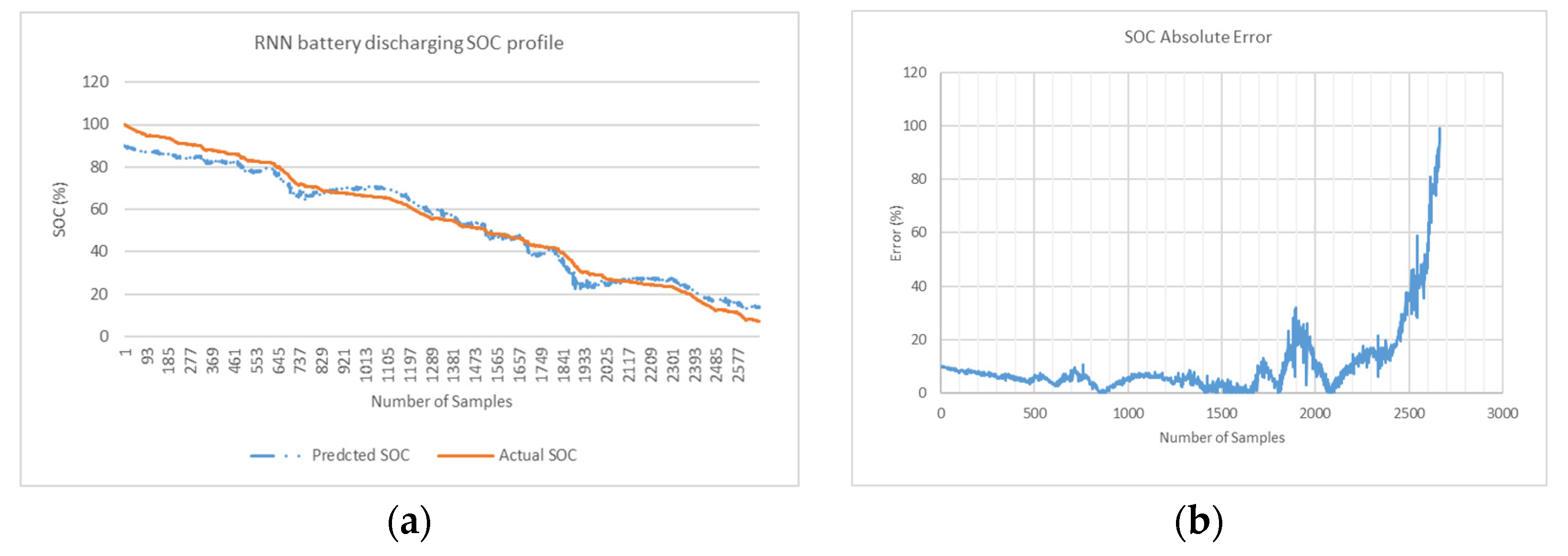
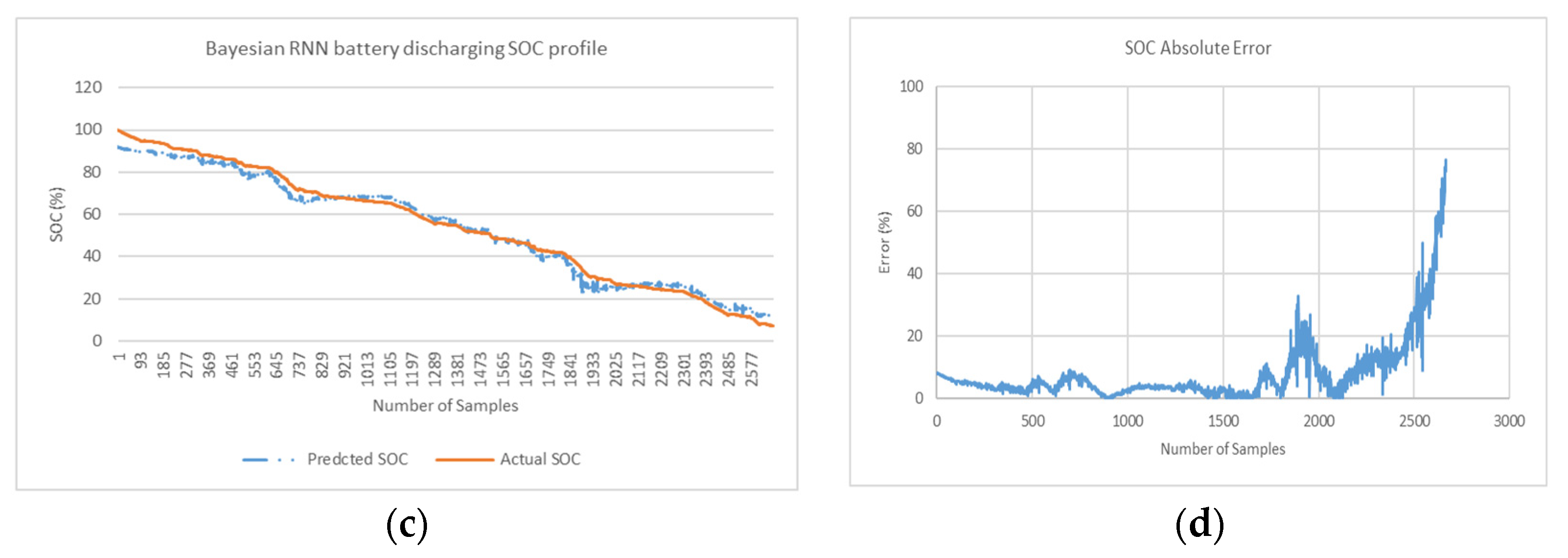
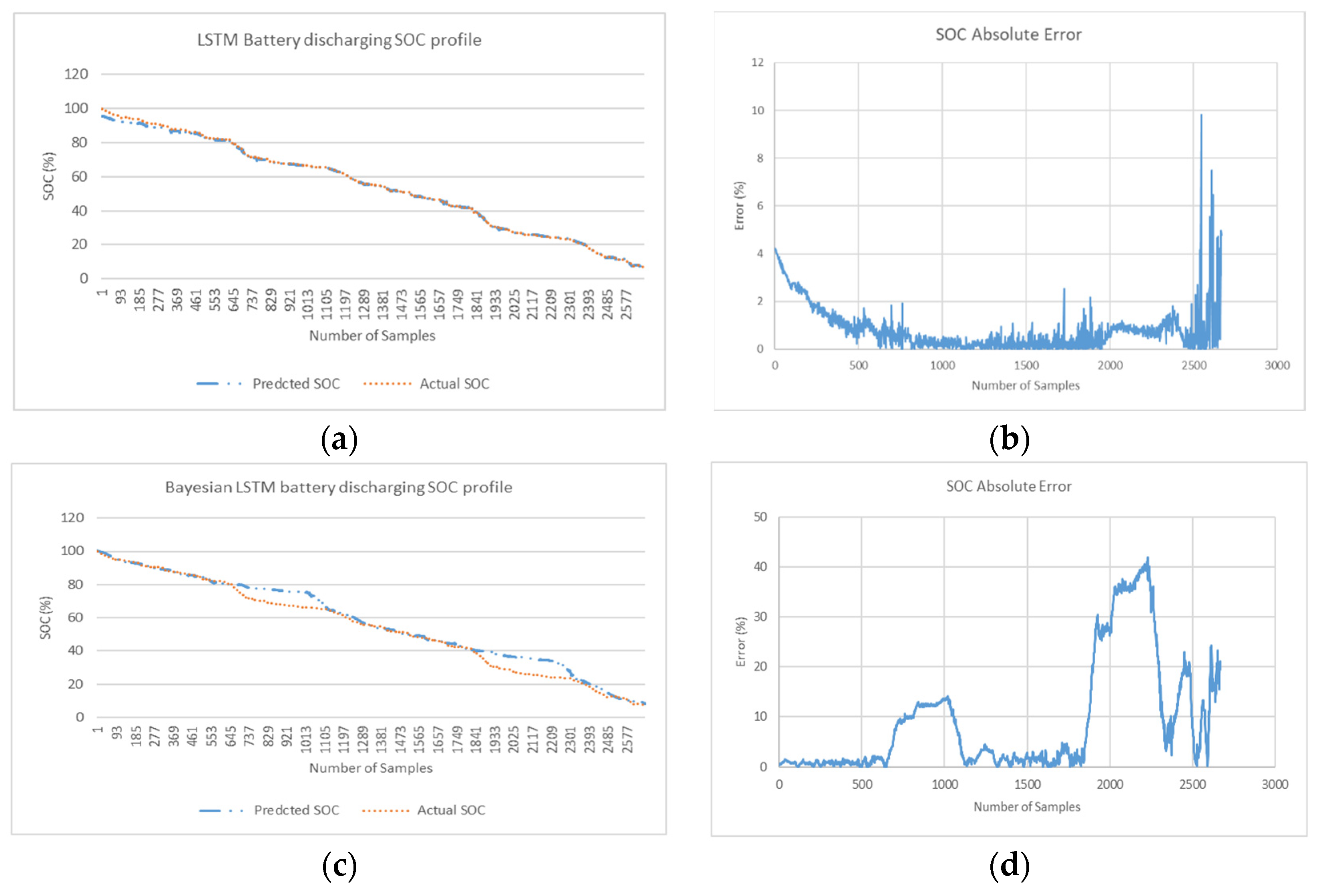
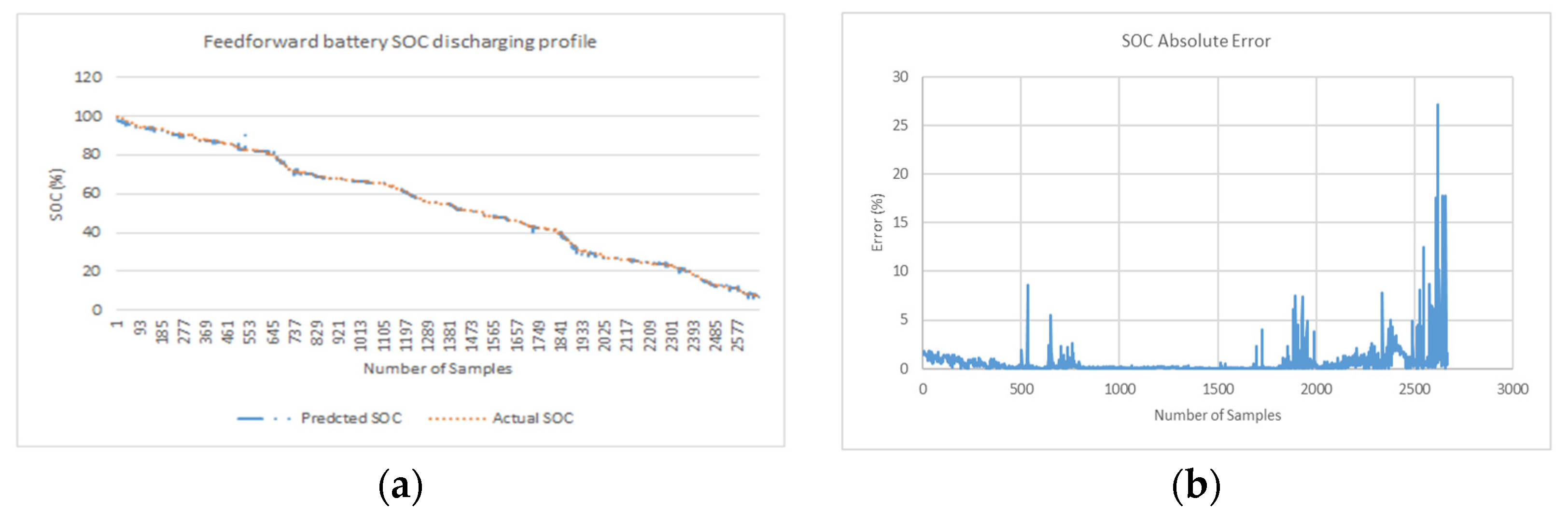
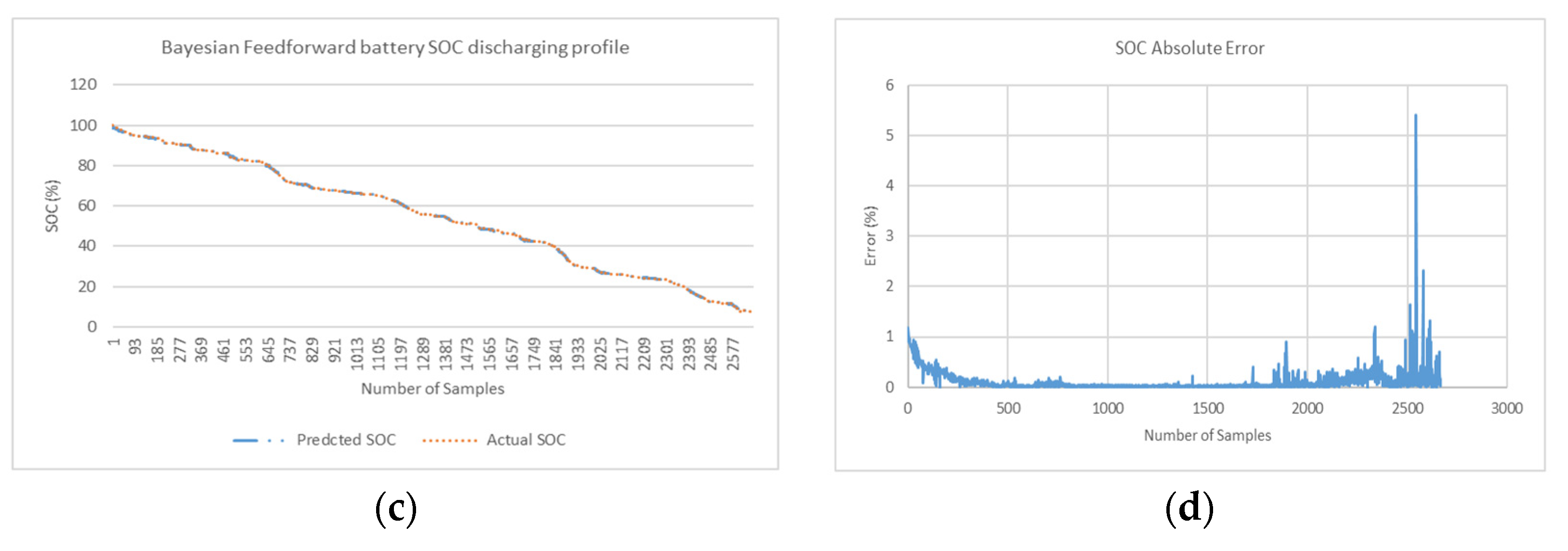
Disclaimer/Publisher’s Note: The statements, opinions and data contained in all publications are solely those of the individual author(s) and contributor(s) and not of MDPI and/or the editor(s). MDPI and/or the editor(s) disclaim responsibility for any injury to people or property resulting from any ideas, methods, instructions or products referred to in the content. |
© 2023 by the authors. Licensee MDPI, Basel, Switzerland. This article is an open access article distributed under the terms and conditions of the Creative Commons Attribution (CC BY) license (http://creativecommons.org/licenses/by/4.0/).





